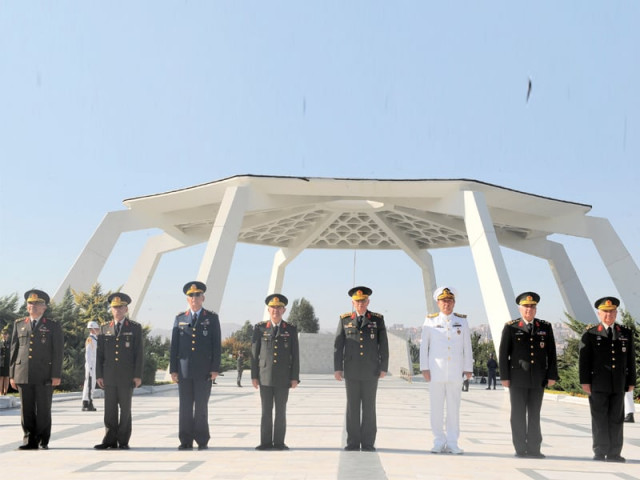The end of the military’s dominance in Turkey?
The army in Turkey is secular and insists that it has a constitutional duty to keep Turkey on the secular path.

The end of the military’s dominance in Turkey?
The Turkish military leadership was cross with the AKP after 22 military officers were arrested for planning the overthrow of the government through a plot named ‘Sledghammer’. General Kosaner, appointed last year, wanted some of the officers released to enable him to promote them in the upcoming meeting of the Supreme Military Council. His choice of the chairman joint chiefs committee had already been rejected by the government.
This is a decisive moment. It puts an end to the military habit of overthrowing governments in Turkey. It did that regularly from 1960 to 1980, provoking comparison with Pakistan and arousing suspicions in Pakistan that the generals here took their cue from Turkey. And America took the blame partially because both Pakistan and Turkey were American allies. But the comparisons were superficial in that the Turkish army overthrew Islamist parties while the Pakistani generals overthrew non-religious ones.
The AKP has emerged as a strong democratic government with internationally acclaimed high economic growth rates under its belt. Despite its background as a coercive Islamist party, it has trimmed its sails according to the social environment in Turkey and has trodden the moderate path, insisted on joining the European Union (EU) and made obeisance to Turkish nationalism. But since its feud with the army began in 2003, it has put 200 retired and serving military officers on trial.
There are a few ‘non-comparisons’ with Pakistan that must be mentioned. The army in Turkey is secular and insists that it has a constitutional duty to keep Turkey on the secular path. The coups it has staged have pushed back any religious movements because the Turkish constitution unlike Pakistan’s, does not declare Turkey an Islamic state. Unlike Pakistan, the press, civil society and the judiciary are opposed to the thinking of AKP leader Prime Minister Recep Tayyip Erdogan. In July 2008, the party narrowly escaped a constitutional court ban, followed by a series of unsuccessful military plots to overthrow the government.
But the AKP is supreme in Turkey, eight years in power and an enviable economic performance. Last year, it won a controversially framed referendum which gave it the right to reform the constitutional court and make Turkey a truly democratic state.
But the ironies will continue to bristle in the coming days. The AKP and Erdogan, feared by secular Turks as harbingers of a fundamentalist order, are not acceptable to the EU because Turkey’s constitution is not in line with the democratic values of Europe. At least this is the objection they raise to Turkey joining the Union, but the fact is that Europe is going through a wave of Islamophobia — the latest demonstration of which the world saw in Norway recently — where Turkey will actually be seen to be more dangerous after becoming democratic.
Prime Minister Erdogan has proved himself to be a cautious man, unmoved by the extreme passions of those who vote for his party. He is promoting a movement of moderate Islam not yet known to the rest of the Islamic world and thus setting up his country as an example of success for Muslims lost to the message of the middle path of their faith. The latest retreat of the Turkish army as the behind-the-scenes driver of Turkey’s policies clears the way for some essential evolutionary experiments on the way to democracy that it was blocking.
Pakistan has always had good relations with Turkey — an ‘all-weather’ friend like China — but their problems are not common. However, Ankara may still be more inclined to the Northern Alliance in Afghanistan than to the Taliban who consider Turkey an enemy because of its troops under the Nato remit in Afghanistan.
Published in The Express Tribune, July 31st, 2011.














COMMENTS
Comments are moderated and generally will be posted if they are on-topic and not abusive.
For more information, please see our Comments FAQ